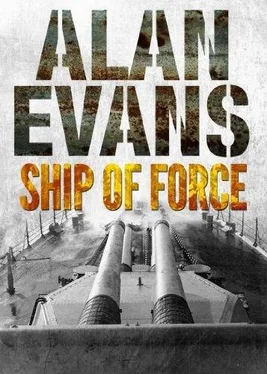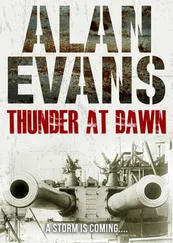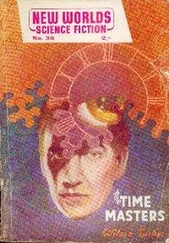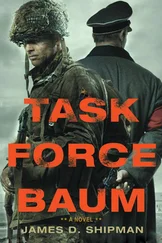Dunbar ordered, “Slow ahead both.”
Sparrow was coming up to her berth at the quay and Smith pointed, saying, “That must be your transport, Mr. Morris.”
Morris glanced across the quay at the big Rolls Royce that had come from St. Pol and returned the waves of the two wildly gesticulating young officers who stood beside it. Sparrow came alongside and tied up. Smith watched Morris walk down the brow and across the quay to have his back slapped by his friends. A cork popped and champagne frothed from a large bottle. Smith shook his head and grinned ruefully. Champagne in the forenoon! He said dryly to Dunbar, “Ah, youth! I’m going to the Commodore.”
Dunbar glanced around but there was no one in ear-shot. He said, “I was near out o’ my mind the night afore last and I’d taken drink beside. But I remember what I said and I meant it, sir.”
Smith answered, “I’ll remember it. But we’ll not talk of it again.” For it was dangerous talk.
Dunbar nodded. “No need, sir.” He watched Smith stride off along the quay, a slight figure, a little shabby and walking quickly, with that sense of urgency there always was about him. Dunbar muttered, “Three years o’ Trist but now at last —” He saw young Sanders in the waist and roared at him, “Sub! Hands to coal ship! And smile! Things are looking up!”
* * *
Smith found Trist in the long room, shuffling papers that littered his wide desk, gathering them together and stuffing them in a drawer. Smith wondered why Trist did not let his staff take the lot away to file or deal with. He suspected Trist was a man who wanted to deal with all of the paperwork, trusting nobody. The Commodore was immaculate but harassed, glancing at his watch. He seemed irritated at Smith’s arrival, snatched the reports handed to him and stuffed them in the drawer.
Smith said, “I think that report to Intelligence is urgent, sir.”
Trist stared at him. “You do, eh? What do you suggest, that I mark it, ‘Commander Smith considers this urgent’?”
Smith swallowed his anger. “Sir, I —”
But Trist had stiffened, remembering. “What was the meaning of that insolent signal?”
Smith looked back at him blankly. “Insolent?”
“You know what I mean. ‘This flotilla will cope.’”
“It wasn’t intended to be insolent, sir. It was an answer and that’s all. We could cope. And —” He hesitated, trying to put it into words. Trying to say that he wanted the flotilla to see itself as an entity with a life and spirit of its own and not just a pair of ships thrown together by words on paper –
Trist did not wait for him. “ I consider it insolent and I will not brook a repetition. Is that understood?”
“Understood, sir.” Smith bit off the words.
Trist glared at him. “Very well.” He glanced at his watch again then down the length of the room to the double doors. The Lieutenant who always sat at a desk outside the doors, apparently on guard, had opened them to admit a party of marines carrying the planks and trestles of a table. Trist said impatiently, “I have representatives of the Army Staff, and possibly the General himself arriving for lunch. We are to discuss future operations. Needless to say, I have promised them maximum support.”
Smith was being dismissed. He had wanted to talk to Trist about the future operations of his flotilla and tell him of Schwertträger — what there was to tell. Trist was in no mood to talk plans but Smith tried once more. “There’s just one thing, sir, and it will only take a minute.” He realised he was pleading for time and was angry again that he should have to. He controlled his voice and said patiently, “That second report, sir. I wish you would look at it and pass it on. And I’d be grateful for your opinion.” That was true enough. He would be grateful to anyone who could possibly shed light on the mystery.
“Oh, all right!” Trist took out the report, scanned it and sniffed. “I suppose it might mean something to Intelligence, if it means anything; the babbling of a man in delirium. In any event it’s their concern and not ours.” He shouted to the Lieutenant and when he came hurrying, thrust the report at him. “For the Director, Naval Intelligence — Urgent.” He looked at Smith. “Satisfied?”
Smith had got only part of what he wanted. He was not satisfied but he said, “Yes, sir.” He left Trist looking at his watch again and chivvying the corporal of marines to “get a move on with that damn table.”
Smith strode rapidly back along the quay, past the bars and cafes on his right hand, the French destroyers tied up at the quay on the other. He was certain now that Trist was a weak and insecure man under the show, anxious about his post, cultivating appearances — and acquaintances such as the General. He would be dangerous because of that, ready to let Smith or anyone else go hang to save his own career. Dunbar was right. Smith swore savagely. He had guessed almost from the beginning that this would be a difficult appointment but it looked worse with every passing day. But fast walking worked the frustration and anger out of him and his sense of humour came to his rescue.
Wildfire and Bloody Mary ! He remembered his bellowed exchange with Victoria Baines. And Galt, that gunner on the twelvepounder singing, ‘I do like to be beside the sea-side’. There were always compensations. He was grinning when he came to the Port d’Echouage and to Sparrow . But he could not waste a minute. This command was still new to him; he had a lot to learn and more to do and he hurried aboard.
Sparrow slipped and moved under the coal chutes. The railway wagons up on the staithes tipped their coal into the chutes and it roared down to crash into the bunkers in an explosion of choking, black dust. The little ship lay in a cloud of it. Smith moved about her deck in a boiler-suit he had borrowed from the Chief Engine-room Artificer, moved among the men toiling in that foul atmosphere. Mostly he watched in silence but now and again he exchanged a few words with one man or another and each time committed a name, a face and an impression of character to memory. He learned that Galt played the mouth organ.
Marshall Marmont’s pinnace came for him but before he went down into her he told Dunbar, “You’re on two hours notice for steam so you can grant shore leave to one of the watches.” He stared up the basin to where it turned. Around that bend lay the Bassin du Commerce where the French destroyers lay — and the old seaman’s quarter with its bars and cafes. The men would make a bee-line for it. He said, “Tell ’em to behave themselves.”
“Aye, aye, sir.” Dunbar knew exactly who he would speak to, familiar names recalled, familiar crimes. McGraw and Galt to start with…
Smith went down into the pinnace and so out to Marshall Marmont where she swung to her anchor in the Roads. The oiler was alongside her and oiling in progress with the fat hoses snaking and looping across the gap between the ships. He moved about the monitor as he had done in Sparrow . He spoke to a pair of young stokers. “This is better than coaling.”
“Oh, aye, sir. You just connect up your hoses and away you go.”
“I’ve just been aboard Sparrow while she coaled. There was a certain amount of bad language flying about but they seemed cheerful enough.”
The two exchanged glances, grinned. One said, “Ah, well, sir. They’re a mad lot in Bloody Mary — I mean Sparrow ,” he corrected hastily. “But after all, sir, you know what they say: ‘If they can’t take a joke they shouldn’t ha’ joined.’”
Smith returned the grin. “That’s right.”
Читать дальше












